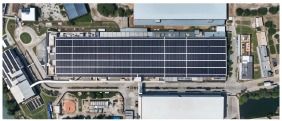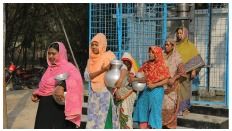![]() Admin
Admin
![]() October 22, 2025
October 22, 2025
![]() (0) Comment
(0) Comment

![]() Admin
Admin
![]() October 22, 2025
October 22, 2025
![]() (0) Comment
(0) Comment
Sustainability: A Strategic Imperative for Modern Businesses
In today's business landscape, sustainability is no longer a peripheral concern, it is a strategic imperative. As climate disruptions, resource constraints, and social inequalities intensify, companies are recognizing that long-term success hinges on responsible growth. Sustainable practices not only reduce operational risks but also unlock innovation, build stakeholder trust, and ensure resilience. In Bangladesh, leading companies have embedded sustainability into their core strategies either through transition to renewable energy sources, water stewardship, or circularity-demonstrating that profitability and purpose can coexist.
Guided by the company's global sustainability framework, BAT Bangladesh has embraced its sustainability goals and adapted them to align with national priorities. The company's sustainability framework is anchored around three strategic impact areas: Climate, Circular Economy, and Nature, which complement the United Nations Sustainable Development Goals (SDGs)
Climate: Reducing Emissions and Enhancing Energy Efficiency
In line with BAT Group's global sustainability targets, BAT Bangladesh has made notable progress in minimizing its environmental impact through energy optimization and cleaner technologies. In 2024, the company installed 5.59 MW of solar capacity across multiple sites, including a 3.2 MW rooftop system at its Savar factory, enabling it to meet 10% of its total electricity needs from renewable sources. This initiative is part of its broader ambition to reach 50% renewable energy usage by 2030.
 To address frequent power outages and reduce reliance on diesel generators, BAT Bangladesh also deployed a Modular Industrial Online UPS, cutting diesel use by 95% over a 40-day period and saving 29,080 liters of fuel - equivalent to 80 tons of CO2 emissions, which was avoided. Additionally, the company purchased 12 MWh of International Renewable Energy Certificates (IRECs) to further support its clean energy transition.
To address frequent power outages and reduce reliance on diesel generators, BAT Bangladesh also deployed a Modular Industrial Online UPS, cutting diesel use by 95% over a 40-day period and saving 29,080 liters of fuel - equivalent to 80 tons of CO2 emissions, which was avoided. Additionally, the company purchased 12 MWh of International Renewable Energy Certificates (IRECs) to further support its clean energy transition.
Circular Economy: Minimizing Waste and Promoting Resource Efficiency
Circularity is deeply embedded in BAT Bangladesh's operations. In 2024, the company sustained less than 1% waste to landfill, while achieving a recycling rate of over 90% across its sites. Advanced composting machines are on track to be introduced in Savar factory, which will reduce organic waste volume by ~80% and contribute to the company's target of 25% waste reduction by 2025 (vs. 2017 baseline)
 Project 'Shurokkha', a pioneering initiative for collecting and recycling crop protection agent (CPA) containers, engaged 2,900 farmers in 2024 alone. These containers are decontaminated and repurposed into non-food-grade products, ensuring safe disposal and reducing environmental hazards in farming communities.
Project 'Shurokkha', a pioneering initiative for collecting and recycling crop protection agent (CPA) containers, engaged 2,900 farmers in 2024 alone. These containers are decontaminated and repurposed into non-food-grade products, ensuring safe disposal and reducing environmental hazards in farming communities.
The company's commercial sites have also piloted modern, automated composting machines that efficiently convert organic waste into usable compost within hours. Plans are underway to scale this technology with higher-capacity units, reinforcing BAT Bangladesh's commitment to responsible waste management.
Nature: Restoring Ecosystems and Conserving Water
 BAT Bangladesh's nature-positive approach is reflected in its afforestation, biodiversity, and water stewardship efforts. Since 1980, the company's afforestation initiative has contributed to the creation of biodiversity corners, medicinal gardens, and green zones across the country -supporting ecological restoration, enhancing biodiversity, and offering fuelwood alternatives for rural communities. This national award winning initiative proudly marks its presence across several locations in Bangladesh, including the Rohingya camp in Cox's Bazar, Kushtia-Jessore Highway,Rajshahi City, and Chattogram Airport among others. As part of its forest-positive commitment, the company also initiated a biodiversity conservation program on 1.72 hectares of barren land, planting 6,500 native saplings to enhance ecological resilience and support habitat restoration.
BAT Bangladesh's nature-positive approach is reflected in its afforestation, biodiversity, and water stewardship efforts. Since 1980, the company's afforestation initiative has contributed to the creation of biodiversity corners, medicinal gardens, and green zones across the country -supporting ecological restoration, enhancing biodiversity, and offering fuelwood alternatives for rural communities. This national award winning initiative proudly marks its presence across several locations in Bangladesh, including the Rohingya camp in Cox's Bazar, Kushtia-Jessore Highway,Rajshahi City, and Chattogram Airport among others. As part of its forest-positive commitment, the company also initiated a biodiversity conservation program on 1.72 hectares of barren land, planting 6,500 native saplings to enhance ecological resilience and support habitat restoration.
 Water stewardship remains a cornerstone of BAT Bangladesh's sustainability strategy. In 2025, the company proudly became the first in the country to achieve full Alliance for Water Stewardship (AWS)
Water stewardship remains a cornerstone of BAT Bangladesh's sustainability strategy. In 2025, the company proudly became the first in the country to achieve full Alliance for Water Stewardship (AWS)
certification across all its manufacturing sites-a landmark recognition of its leadership in industrial water governance. With a 35% reduction in water withdrawal (vs. 2017 baseline) and a 39.1% water recycling rate, BAT Bangladesh continues to set the benchmark for responsible water management in the private sector.
The company's clean drinking water initiative continues to improve lives in arsenic- and salinity-affected regions, operating over 120 filtration plants across 25 districts to enhance access to safe water and support better community health.
Embedding Sustainability for Long-Term Impact
BAT Bangladesh's sustainability journey reflects a unified vision where environmental stewardship, operational excellence, and community empowerment progress together. By embedding sustainability into its core strategy, the company aims to create shared value for its business, stakeholders, and the wider community.
As Bangladesh approaches 2030, the commitment and preparedness of industries to adopt sustainability principles will be pivotal in determining the nation's path toward inclusive and resilient growth. In their role as responsible corporate citizens, all institutions bear a collective responsibility to actively contribute to this transformative journey, thereby supporting the country's ongoing development and advancement.